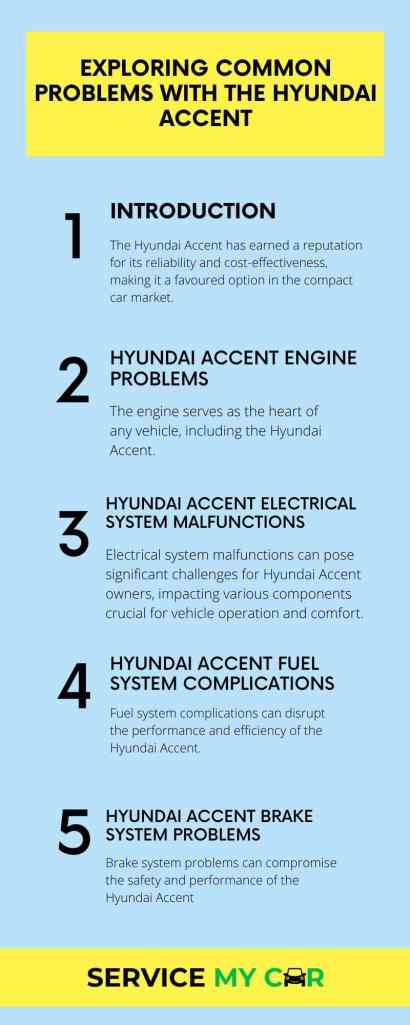Exploring Common Problems with the Hyundai Accent

The Hyundai Accent stands as a popular choice among compact car enthusiasts, offering affordability, fuel efficiency, and a stylish design. However, like any vehicle, it is not immune to certain common issues that owners may encounter over time. In this comprehensive guide, we’ll delve into some of the most frequently reported problems with the Hyundai Accent, along with tips on how to address them. Additionally, we’ll introduce “Service My Car,” a company dedicated to providing all types of car services, including those for the Hyundai Accent.

Introduction
The Hyundai Accent has earned a reputation for its reliability and cost-effectiveness, making it a favoured option in the compact car market. Nevertheless, it’s essential for owners to be aware of potential issues that could arise during the ownership journey. In this guide, we’ll explore various common problems reported by Hyundai Accent owners, offering insights into their causes and potential solutions. Plus, we’ll introduce you to “Service My Car,” your trusted partner in maintaining your Hyundai Accent’s performance and longevity.
Hyundai Accent Engine Problems
The engine serves as the heart of any vehicle, including the Hyundai Accent. While generally reliable, Hyundai Accent owners may encounter several common engine-related issues, requiring prompt attention to ensure continued performance and longevity.
Overheating:
One prevalent issue reported by Hyundai Accent owners is engine overheating. This can occur due to various factors, including a malfunctioning thermostat, coolant leaks, or a faulty radiator fan. Symptoms of overheating may include the temperature gauge consistently in the red zone or steam emanating from under the hood. Addressing overheating promptly is crucial to prevent potential engine damage.
Oil Leaks:
Another common engine-related problem is oil leaks. These leaks can occur due to worn-out gaskets, faulty oil seals, or loose drain plugs. Symptoms may include oil spots under the vehicle or a noticeable decrease in oil levels. Ignoring oil leaks can lead to insufficient lubrication and eventual engine damage. Regularly checking oil levels and addressing leaks promptly is essential for engine health.
Check Engine Light:
The check engine light is a source of frustration for many car owners, including Hyundai Accent drivers. This light can illuminate due to various issues, such as faulty oxygen sensors, loose gas caps, or malfunctioning catalytic converters. When the check engine light activates, it’s advisable to have the vehicle inspected by a qualified mechanic to diagnose the specific cause and address it accordingly. Ignoring the check engine light can lead to worsening engine performance and potential damage.
Hyundai Accent Electrical system malfunctions
Electrical system malfunctions can pose significant challenges for Hyundai Accent owners, impacting various components crucial for vehicle operation and comfort. While less common than some mechanical issues, electrical problems can still arise and require prompt attention to aintain the vehicle’s reliability and safety.
Faulty Battery:
A common electrical issue reported by Hyundai Accent owners is a faulty battery. Symptoms may include difficulty starting the vehicle, dimming interior lights, or malfunctioning electrical accessories. Over time, batteries naturally degrade, leading to reduced performance. Regular battery checks and replacements as needed are essential to prevent unexpected breakdowns.
Alternator Failure:
The alternator plays a vital role in charging the battery and powering the electrical system while the engine is running. In some cases, Hyundai Accent owners may experience alternator failure, resulting in a drained battery and loss of electrical power. Signs of alternator failure may include dimming lights or dashboard warning indicators. Prompt inspection and replacement of a faulty alternator are crucial to maintain proper electrical function.
Electrical Shorts:
Electrical shorts can occur due to damaged wiring, faulty switches, or malfunctioning electrical components. Symptoms may include blown fuses, malfunctioning lights, or non-functional power windows. Electrical shorts can disrupt various systems within the Hyundai Accent, leading to inconvenience and safety concerns. Professional inspection and repair are necessary to identify and rectify electrical shorts effectively.
While the Hyundai Accent’s electrical system is generally reliable, owners may encounter issues such as faulty batteries, alternator failure, or electrical shorts. Addressing these problems promptly with the assistance of a qualified technician is essential to ensure continued vehicle operation and safety.
Hyundai Accent Fuel System Complications
Fuel system complications can disrupt the performance and efficiency of the Hyundai Accent, leading to various issues that require prompt attention to maintain optimal operation.
Fuel Pump Failure:
A common problem reported by Hyundai Accent owners is fuel pump failure. This can result in a loss of power, engine stalling, or difficulty starting the vehicle. Symptoms may include sputtering or hesitation during acceleration. If you experience any of these signs, it’s essential to have your fuel system inspected by a qualified technician. Replacement of the fuel pump may be necessary to restore proper fuel delivery to the engine.
Fuel Injector Issues:
Another fuel-related issue is problems with the fuel injectors. Symptoms may include rough idling, engine misfires, or decreased fuel efficiency. Over time, fuel injectors can become clogged or worn, affecting fuel atomization and combustion. Professional inspection and cleaning or replacement of the fuel injectors may be necessary to restore optimal engine performance.
Fuel Tank Leaks:
Fuel tank leaks can pose safety hazards and affect fuel efficiency. These leaks may occur due to corrosion, damage from road debris, or faulty seals. Symptoms may include the smell of fuel inside the vehicle or visible fuel puddles underneath. Prompt identification and repair of fuel tank leaks are essential to prevent fuel loss and potential fire hazards.
While the Hyundai Accent’s fuel system is generally reliable, owners may encounter issues such as fuel pump failure, fuel injector problems, or fuel tank leaks. Addressing these complications promptly with the assistance of a qualified technician is crucial to ensure continued vehicle performance and safety.
Hyundai Accent Brake System Problems
Brake system problems can compromise the safety and performance of the Hyundai Accent, making it essential for owners to address these issues promptly to maintain optimal braking performance.
Brake Noise:
One common problem reported by Hyundai Accent owners is brake noise, such as squeaking or grinding when applying the brakes. These noises can indicate worn brake pads, warped brake rotors, or debris lodged in the braking system. Ignoring brake noise can lead to further damage to brake components and compromise stopping power. Professional inspection and replacement of worn or damaged brake parts are necessary to restore quiet and effective braking.
Brake Fluid Leaks:
Brake fluid leaks are another issue that Hyundai Accent owners may encounter. These leaks can occur due to damaged brake lines, worn seals, or a faulty master cylinder. Symptoms may include a soft or spongy brake pedal, decreased braking performance, or visible fluid puddles underneath the vehicle. Brake fluid leaks compromise the integrity of the braking system and pose safety hazards. Prompt identification and repair of leaks are essential to maintain proper braking function and safety.
Brake Failure:
While rare, instances of brake failure can occur in the Hyundai Accent. This can result from various factors, including a malfunctioning brake booster, a faulty master cylinder, or excessively worn brake pads. Signs of brake failure may include a sudden loss of braking power, a soft or spongy brake pedal, or the illumination of the brake warning light on the dashboard. Brake failure poses a significant safety risk and requires immediate attention. Professional inspection and repair of the brake system are essential to ensure safe operation of the vehicle.
Conclusion
In conclusion, while the Hyundai Accent offers reliability and affordability, it is essential to be aware of potential problems that may arise. Regular maintenance, timely repairs, and proactive troubleshooting are crucial for ensuring the vehicle’s longevity and safety. As you navigate these common issues, remember that “Service My Car” is here to provide comprehensive car services, ensuring your Hyundai Accent receives the care it deserves for optimal performance and reliability.
At Service My Car, we pride ourselves on providing access to the best mechanic workshop in Bolton, United Kingdom. Our comprehensive network of top-notch car garages are well-equipped and staffed with highly skilled technicians to ensure your car gets the best service possible. Whether you are looking for a routine service, or require a more intricate repair work, our platform connects you with the most reliable car garage in Bolton that best meets your needs.
Leave a reply
You must be logged in to post a comment.







